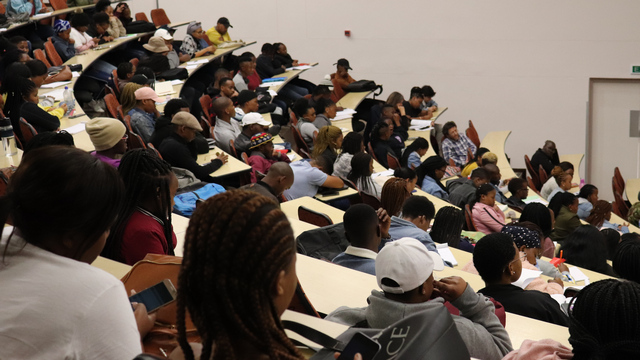
By Tanatswa Chivhere, third-year Journalism and Media Studies student
Over 100 students gathered in Barratt Lecture Theatre to listen to Dr Somadoda Fikeni’s speech, which took place during the Politics and International Studies Department’s Teach-In Week.
The Department invites various speakers to comment on recent national events and help students’ understanding of politics at work in the national sphere. This year’s theme, The Opposition in Crisis, is influenced by the uneven growth patterns amongst opposition parties in the most recent national elections. By the end of the week, students should better understand the various growth patterns and how they affect the momentum of the political party in power.
Dr Fikeni, an established political analyst and current Director of VC of Special Projects at the University of South Africa, describes the political landscape as a “one-party dominant system”. Since independence and the transition to democracy, the ruling party has remained dominant in the majority of Southern African countries, in spite of the existence of a multi-party system. One of the factors that have led to the development of this system is the opposition’s move from one crises to another. “In countries where opposition parties ascend to power, they fail to hold on to and consolidate power – instead they crumble and disintegrate into bitter disputes,” Dr Fikeni stated.
He emphasised the analysis of key analytical tools which are often overlooked when looking at the subject at hand. Firstly, one must find where the agency of individual political players start and end and where structural issues affect the outcome and how these two interface.
Secondly, there are questions surrounding how voters understand issues such as corruption, and whether voters are more sophisticated than we give them credit for. The issue of rationality is difficult to decipher because, Dr Fikeni said, “what looks innocent is often pregnant with various meanings depending on who is saying it, why and when”.
Thirdly is the misuse of the ‘Good vs Evil’ trope. He summed this up with the adage “There are no permanent friends or permanent enemies in politics, only permanent interests”.
Fourthly is the issue of South African nationalism, and lastly, the global and local trends which affect the way we view things – both which must be considered when conducting an analysis of the subject.
Dr Fikeni began his analysis of the crises of the opposition parties by looking at the state and strategy of the ruling party and how it impacts the opposition. The key factors of one-party dominance include the appropriation of liberation struggles and the importance of symbolism. There is a fusion between the ruling party and the state. This symbolism often leads to a control of the narrative by the dominant party and opposition parties become marginal. In addition, the ruling party has pre-established ideological structures. The ideological structure has led to trans-national solidarity platforms where ruling parties across the region assist each other. This makes it difficult for opposition parties to seek assistance from outside forces.
The opposition parties are impacted by the view that they are protectors of the status quo. This issue is highlighted by the passing of the Political Party Funding Bill. This will most likely have a negative effect on the opposition because companies which usually support them also seek government contracts. In addition, leadership issues such as poor succession planning, are greatly detrimental to opposition parties.
However, the biggest issues are the short-sightedness of revenge politics and the politics of identity, he said. Dr Fikeni stated that a party with revenge as its main focus is more likely to lose its ideological values along the way. In addition, opposition parties often have multiple ideological beliefs which lead to the creation of a potent ideological cocktail which leaves confusion in its wake.
Dr Fikeni believes that there is “no immediate prospect that the trends we see will change”.
